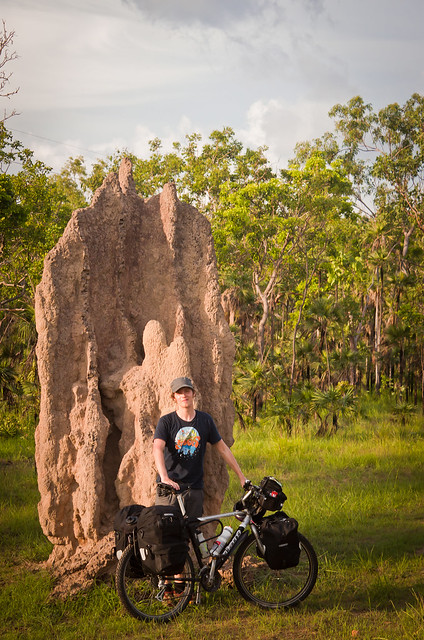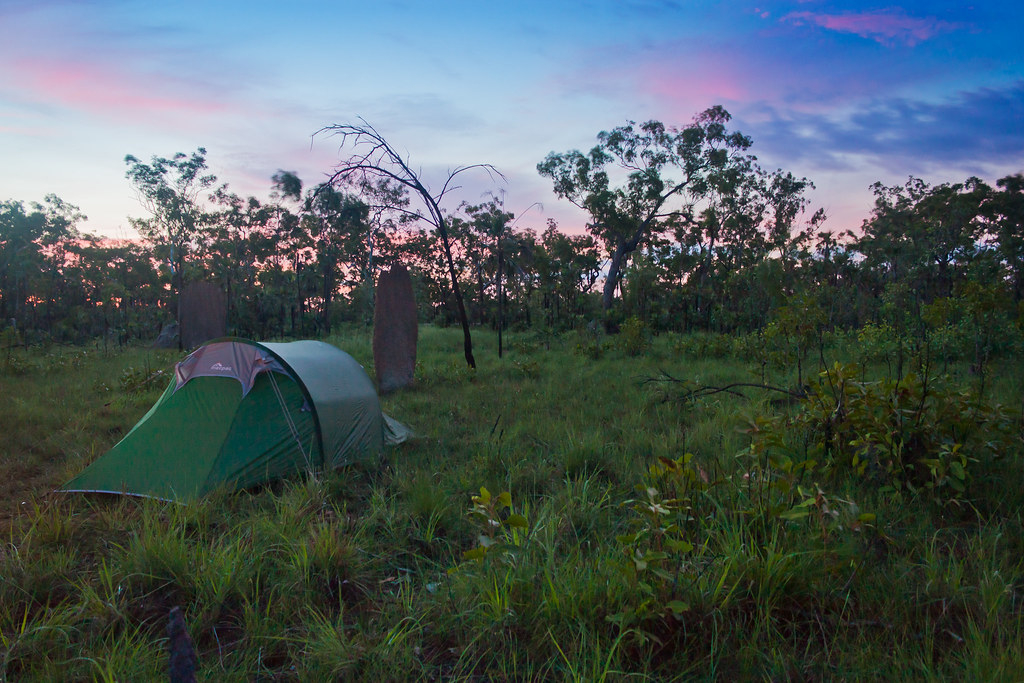In a field of magnetic termite mounds, 60 kilometres south of Mandorah, North Territory, Australia.
It's been dark for a couple of hours now, but it is almost unbearably hot. The netbook screen has condensation across it, and we are both glazed in sweat lying in the tent just off a deserted road in the Northern Territory, thinking about going to sleep.

The guests at the hostel were lovely though, and nodded in mutual understanding as I explained what had happened. This night manager, or whatever he was, seemed to have the customer service skills of a rabid wolf, and looked like he had been coming down from an acid trip since the mid 1970's.
We wanted to leave early the next morning, so we set about putting the bicycles back together. After a bit of a panic about the fact that my handlebars would not reattach correctly to the bike – an issue solved after an hour by the enlightened idea of cracking them with a rudimentary mallet – Pascal, my room mate, Olivia and I went into town to get a bite to eat and enjoy a cold beer.
 |
| Darwin sunset - nice! |
Darwin is a small city, only about 128'000 people, although you could be forgiven for thinking that figure to be substantially less when wandering about the streets. With the odd rowdy exception the bars are quiet along the main strip, and by the time we were out looking for food – about 11pm – there were no more than a handful of people wandering about. This low density remained even in the morning when I ventured out to buy a coffee the next day.
But what grabs you about Darwin, in the way that Hulk Hogan, or the terminator might grab you if you did something to particularly offend them, is the heat. By Christ is Darwin hot. Even arriving in the evening and mooching around until past middnight, the heat was at us the whole time. Lovely for sitting around in air conditioned bars supping on a frosty beverage, but what would it be like for cycling?
The next morning, after a heavy load of monsoon rain failed to lower the mercury level, Olivia and I packed up and checked out. The manager of the hostel apologised for the mix up the night before, and explained she had accidentally moved our booking by mistake. She was very nice about it all, and it set us right for the first day cycling. Luckily the one camping shop in town stocked a replacement fuel cannister for us, so once we had picked that up, along with a few other odds and ends, we caught the ferry over the bay.
The water around here is quite something. It is the same colour turquoise that you see in the swimming pools of swanky hotels, but be warned all ye who wish to dive in. This is crocodile country, and as we left the Darwin jetty and pulled past a sand dune just beyond, Liv pointed out a “saltie” sunning itself on the bank, and showing off it's rows of teeth. Teeth that sit in the most powerful pair of jaws in the animal kingdom – stronger even than a Great White's. You don't go swimming around here, unless you're weird and like being eaten by crocodiles.
View Larger Map
The ferry ride was short but interesting. We chatted to an Aboriginal man called Timothy, a slender fellow with bone white stubble. He was from Western Australia, although I couldn't work out what brought him this far north. Coming from Melbourne whose Aboriginal population manages to remain almost completely invisible it was a big difference seeing so many here in Darwin. What is staggering about it is how many of them are begging on the streets, or hanging around drinking. Aboriginal culture is in a very bad way at the moment, and there seems to be very little that can be done about it. Alcohol abuse is rife – Timothy was drunk when we met him, and it was only 1pm – and it's common to hear about groups of Aboriginals fighting on the streets at night. When we walked around the city we saw two very different classes living side by side. White people, wearing smart clothes, out with a groups of friends for a drink or a meal and a good time. Then there are Aboriginal people, barefoot, sitting in parks, begging on the streets, or wandering into courtyards to pester patrons for a cigarette. People argue that Aboriginals are being given the chance to sort themselves out and get jobs and all of the rest of it – I don't know enough about that to comment. But it seems to both Olivia and I that what has happened here is two apparently incompatible cultures have collided and the one with the muscle is crushing the other.
Think about it. Aboriginal culture was nomadic, with people roaming from place to place to follow seasonal sources of food. European culture arrives and the idea of land ownership crops up, and suddenly these people are trespassing. Their nomadic culture can't work in a country dominated by the west. Why should they have to fit into our society and get jobs like us? That's not how they live. Many now live in communities outside of the city. We rode past one, and the area that it stood in has strict controls over alcohol and pornography. As I say, alcohol abuse is an issue – but moving Aboriginal people into static communities, and then making activities illegal there that are legal in the city just a few kilometres away, stinks of racism. It is more complicated than this, I know, but it is very uncomfortable to see.
I don't want to bang on about this issue because I don't know enough about it to give anything more than a few observations and repeat a few things I've heard, but before I shut up about it I feel it's worth pointing out some of what's being lost right now. When I came to Australia I imagined Aboriginal culture to be like prehistoric hunter gatherers, roaming around and drawing funky pictures of platypus on rocks, but not much else. But what little I have picked up about it has shown it to be a complex society built on an understanding with the land, where people moved around to follow the seasonal fluctuations of food, but monitored what they used so that stocks would not be exhausted. This knowledge of the land was passed on through their dream time stories, that held within them information about the area from which the originated. So by learning them, individuals would know the best routes through an area, where to find water and food, and where people hostile to them might be met. These stories connected across the landscape like a jigsaw, revealing more and more about wider areas to those who went out to learn them. This oral tradition of story telling goes back thousands of years – a place I stayed in New South Wales had a dream time story describing a volcanic eruption, that is dated by geologists as taking place in the area several thousand years ago. It is very sad to hear that this tradition is being lost at a rapid rate, many stories and even languages disappearing as the last remaining keepers of the knowledge pass away. Timothy didn't talk about any of this though, he talked about the time he rode a camel in Broken Hill, and it tried to spit on him, and within 15minutes we were on the other side of the bay at a small place called Mandorah.
I say small place because I'm not sure how one would classify it. It's marked with a large yellow dot on the map, marking it's significance as being one down from Darwin But apart from the jetty, and a hotel there was just a road – our road. Would the road reveal any more of Mandorah? Ern... no.
It's one week until we fly from Darwin to Indonesia, and so perhaps it's not completely accurate to say that our trip has begun just yet. We're not heading off into the sunset this week, but rather doing a circular trip from Mandorah, down to Litchfield national park, and then back up to Darwin along the eastern highway.
 |
| The road down from Mandorah. |
To keep us interested along the way, and to distract us from the relentless heat, we would occasionally hear creatures scuttle off into dry leaves, or see a branch rock just after something scurried off from it. Australia is of course world famous for its animals and insects, and I was very keen to spy a frilled necked lizard, or a snake or two. But on each occasion the creature that made the sounds we heard was off and away before we even had time to turn our heads. We did spot one frilled neck eventually, unfortunately it was squashed in the middle of the road. It didn't look very frilled about that.
 |
| Robin next to a Cathedral termite mound. They got much bigger than this too. |
And yet the prospect of just stopping and walking our bikes into a random section of the stock scenery we had seen all day, and pitching a tent wasn't all that appealing, incredibly enough. It felt a little anticlimactic. It seemed that was going to have to be it though, until Liv came up with an excellent plan – why not camp amongst the termites! Just a way back through the bush were flat open tracts of land peppered with magnetic termite mounds – great flat dishes of mud all stacked in the same direction to avoid the worst of the midday heat.
We quickly found a spot. Set up the tent, and set about cooking dinner just as the sun went down. Various completely alien creatures made loud gurgles and squeaks off in the distance to mark the end of the day. This is it now, the end of the day. Litchfield tomorrow after an early rise, and who knows, maybe we'll spot an alive frilled necked lizard. All we need to do now is figure out how to get to sleep in this sauna – although putting this netbook away would probably be a good start.


No comments:
Post a Comment